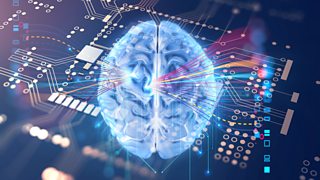Artificial Intelligence and machine learning at the Βι¶ΉΤΌΕΔ: from the iPlayer to...infinity?
Gabriel Straub
Head of Data Science and Architecture
Tagged with:

Machine learning is still in its early stages at the Βι¶ΉΤΌΕΔ. While we've been working on it for some time within Βι¶ΉΤΌΕΔ Research & Development, we have only more recently started exploring how we can use these tools in our production areas.
Βι¶ΉΤΌΕΔ iPlayer uses machine learning to provide personalised recommendations to audiences based on their viewing habits and detects when a programme's end credits start, as it's been found that more people respond to recommendations when they are shown at this time.
Overall, recommendations on Βι¶ΉΤΌΕΔ iPlayer have increased the time audiences spend with us.
Elsewhere, recommendations are also being used successfully by Βι¶ΉΤΌΕΔ News, and our metrics are showing us that this is driving our audiences to look at more pages.
This barely scratches the surface of the potential of machine learning, though, and at the moment we can't even answer basic questions such as how much content we have on a particular topic.
This is because we have a lot of different systems that need to be searched through and because our approach to classifying or tagging content hasn't always been consistent across different parts of the Βι¶ΉΤΌΕΔ.
So for example, the topic of ‘pirates’ means something quite different for children's content than it does for news, so how can we differentiate?
This is where machine learning can help. We are currently exploring whether automatic tagging is possible, to improve consistency. This will help us surface more relevant content to audiences and bring the right content in front of the right user, at the right time.
The Research & Development team has built a number of tools to help with this. One tool searches in articles for keywords, such as the names of people and places, and another extracts topics by finding words that are most likely to be linked to them. So, for example, it can tell that an article using the words revenue and share price is most likely a business article.
We now need to bring together some of these different initiatives. To address this Anne Bulford, Deputy Director General, and Matthew Postgate, Chief Technology and Product Officer, have sponsored the Connected Data programme.
Connected Data is building a shared data science and machine learning platform that will make data available about all Βι¶ΉΤΌΕΔ content, and provide tools and services that enable product teams to use, enhance and extend the platform to deliver richer audience experiences, more easily.
We are also working on creating training materials to educate developers and colleagues more widely about machine learning. A Βι¶ΉΤΌΕΔ Academy website with resources has been developed and we are running courses.
We are very much at the beginning of our journey with machine learning, but it could really have a huge impact, not just for our audiences, but also for everyone at the Βι¶ΉΤΌΕΔ.
